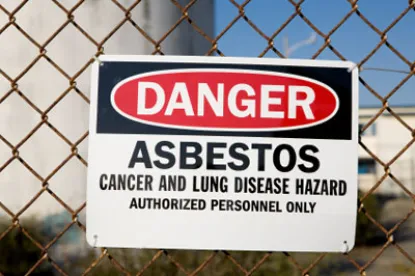Aligning with neighboring New York, and clearing up conflict within the Appellate Division, the New Jersey Supreme Court ruled equipment manufacturers can be held strictly liable on the basis of failure to warn for asbestos-containing component parts made or supplied by third parties. Whelan v. Armstrong Int’l, Inc., (N.J. 6/3/20).
The Court in Whelan affirmed the New Jersey Appellate Division’s denial of summary judgment and remanded the case to the trial court. In doing so, the Court held that manufacturers and distributors may be found strictly liable for failure to warn of the dangers of their products, including their asbestos-containing components and a third-party’s replacement components, provided that a plaintiff can prove all of the following:
-
The manufacturers or distributors incorporated asbestos-containing components in their original products
-
The asbestos-containing components were integral to the product and necessary for it to function
-
Routine maintenance of the product required replacing the original asbestos-containing components with similar asbestos-containing components
-
The exposure to the asbestos-containing components or replacement components was a substantial factor in causing or exacerbating the plaintiff’s disease.
Justice Albin authored the majority opinion. Chief Justice Rabner and Justices LaVecchia, Solomon, and Timpone joined in Justice Albin’s opinion. Justice Patterson filed a dissent, in which Justice Fernandez-Vina joined.
The plaintiff in Whelan worked on the defendants’ products while performing maintenance as a residential and commercial plumber and automobile mechanic over a 40-year period. Whelan alleged that he contracted mesothelioma while working on the defendant manufacturers’ and distributors’ products, and, in particular, those products’ asbestos-containing components or the asbestos-containing replacement components manufactured or supplied by third parties, who were not named as defendants.
Recap: The Trial Court’s and Appellate Division’s Decisions
The plaintiff argued that the defendants had a duty to warn about the dangers of exposure not only to asbestos-containing component parts but also to the required asbestos-containing replacement components manufactured or supplied by third parties. The defendants countered that they owed no duty to warn about the dangers of such asbestos-containing replacement components, which were “incorporated into their products after those products left their control.”
The trial court granted the defendants summary judgment and dismissed the plaintiff’s complaint because he failed to show with specificity that he was exposed to asbestos products “actually manufactured or distributed by [the] defendants” on a regular and frequent basis. The trial court concluded that the defendants “could not be held liable for the replacement components manufactured or distributed by third parties – even if those components were similar to the asbestos-containing components originally integrated into their products.” The plaintiff appealed.
The Appellate Division reversed the summary judgment order. Judge Currier, writing for the panel, rejected the holding of a previous Appellate Division case, Hughes v. A.W. Chesterton Co., 435 N.J. Super. 326 (App. Div. 2014). “In contrast to the Hughes court, the Whelan panel concluded that defendants could be held strictly liable for the failure to warn about a third party’s asbestos-containing replacement components essential to the functioning of the product, provided that Whelan established medical causation.” Unlike the Hughes court, which defined the “product” as only the pump at issue in the case, the Whelan panel defined the “product” as “the complete manufactured item as delivered by the manufacturer to the consumer.”
The NJ Supreme Court’s Rationale in Whelan
The New Jersey Supreme Court affirmed the Appellate Division and reasoned that expanding defendant manufacturer and distributor liability to cover asbestos-containing component parts manufactured or supplied by third parties “satisfies an abiding sense of basic fairness under all of the circumstances in light of considerations of public policy.”
The Court cited other jurisdictions’ courts, including the New York and Maryland Courts of Appeal, as having reached the same decision under similar circumstances. Nevertheless, the Court recognized that other jurisdictions have reached different results, including the Supreme Courts of Washington, Georgia, and California.
The Whelan Supreme Court reasoned that:
[I]mposing a duty to warn about the dangers of asbestos-containing replacement components, regardless of who manufactured those components, adds hardly any further burden or cost to the product manufacturers, who already have a duty to warn of the dangers of the original asbestos-containing components. The manufacturers are in the best position to know the useful life – the wear and tear – of the asbestos-containing components in the product in which they operate, and the user of the product is likely to be more alert to a warning on the product than one that comes with the component part. It is only fair that the defendant manufacturers, who profit because the replacement components extend the life of their products, bear and spread the cost of the harm they caused.
The Court further reasoned that extending the duty to warn, and thereby the defendants’ liability, would not create a disincentive for plaintiffs to identify asbestos-containing component part manufacturers because, if anything, those manufacturers would serve as another source for the payment of damages. The Whelan Court predicted that its decision will incentivize defendants to identify asbestos-component manufacturers so that they may share the damages burden. The Court added that plaintiffs are not entitled to “double recoveries.”
Justice Patterson’s Dissent
Justice Patterson dissented stating, “In today’s decision, the majority substantially alters the test for medical causation that has governed our state’s asbestos litigation for decades. The majority does not base its revision of the standard on any showing that the existing rule deprives asbestos plaintiffs of a remedy.” Justice Patterson explained, “The majority reformulates the medical causation standard to require proof only that ‘the exposure to the asbestos-containing components or replacement components was a substantial factor in causing or exacerbating Whelan’s disease.’” Justice Patterson stated that this represents a material departure from James v. Bessemer Processing Co., 155 N.J. 279 (1998), where the New Jersey Supreme Court “eased the plaintiff’s burden of proof but expressly declined to hold one defendant responsible for harm caused by a product that it neither manufactured nor sold.”





 />i
/>i
